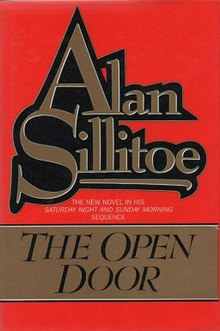The Open Door is a 1989 novel by Alan Sillitoe. It is the third and final part of the Seaton family trilogy which commenced with Saturday Night and Sunday Morning (1958) and then Key to the Door (1961).[1][2][3][4][5]

References
edit- ^ Encyclopedia of British Humorists: Geoffrey Chaucer to John Cleese 0824059905 Steven H. Gale - 1996 "Many of Sillitoe's subsequent novels are interrelated, even though some were published decades apart. Thus, for example, Brian Seaton, the semi-autobiographical protagonist of Key to the Door and The Open Door, is the older brother of Arthur Seaton; the first novel to have been written in what is now termed the "Seaton trilogy" is actually the third in the chronology of the plots. The novels of the "William Posters Trilogy," however, were published in chronological order— The Death of .
- ^ The Contemporary Review - Volume 254 1989- Page 213 " - Equally remarkable, though for different reasons, is Alan Sillitoe's new novel, The Open Door. It is the third and final volume of the Seaton trilogy, the other two being Saturday Night and Sunday Morning and Key to the Door. The scene is Nottingham, to which Brian Seaton returns after what should have been his demobilisation from Malaya in 1949: but the late discovery by army doctors that he has tuberculosis dashes his hopes of finding a new, exciting career in civilian life, based on ...
- ^ Understanding Alan Sillitoe Gillian Mary Hanson - 1999 - Page 12 157003219X A collection of previously published short stories, The Far Side of the Street, came out in 1988. It was followed by the third novel in the sequence that began with Saturday Night and Sunday Morning and The Key to the Door, entitled The Open Door (1989). In this work the central character, Brian Seaton, returns THE MAKING OF A WRITER to .
- ^ Critical survey of long fiction: English language series Frank Northen Magill - 1991 - Page 3031 - What next for Brian Seaton? The Open Door, a novel which picks up the story of Brian Seaton at age twenty-one, articulates the vision Sillitoe struggled unsuccessfully to capture in the William Posters trilogy. Like Key to the Door, The Open Door has strong autobiographical overtones. Perhaps it supplies the answers about Smith and the Seatons more convincingly because it offers what Sillitoe has lived rather than what he has abstractly concluded. Upon his return from Malaysia, ...
- ^ Contemporary Literary Criticism: Excerpts from Criticism of the ...Roger Matuz - 1990 0810344319 - However, there are some less than subtle differences between this Brian and the Brian of Key to the Door. The Malayan communists, for example, have faded in his memory with remarkable rapidity. Is this Brian's or Sillitoe's own "retrospective falsification"? It hardly matters: The Open Door is so superior to Key to the Door that it would be worth destroying all trace of the latter. Indeed, Sillitoe may well have delivered himself of the autobiography of his immaturity in his account of Arthur ...